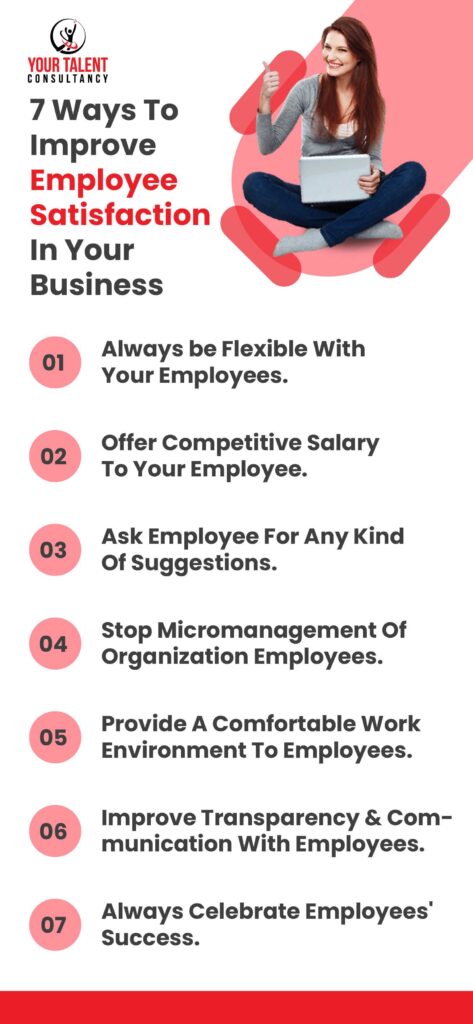
11 Ways To Improve Employee Satisfaction In Your Business
The success of any business relies heavily on its employees' dedication to achieving company goals. Dissatisfied employees struggle to focus on their work, hampering productivity and growth.
As a business owner, you understand the vital role of employee satisfaction. In this article, we'll explore seven effective ways to boost employee contentment and drive business growth. These strategies are applicable to both individual business owners and organizations, offering valuable insights for fostering a motivated workforce.
We will delve into 11 of the most effective methods for boosting employee satisfaction in your business, offering insights that can propel your organization to new heights
11 Effective Ways To Improve Employee Satisfaction In A Company
These are the 11 highly effective methods currently employed by many large organizations to enhance employee satisfaction and stimulate organizational growth

1. Be Flexible With Your Employees
Flexible working hours are not only related with lesser workplace fixed cost, but are positively related with employee motivation, reduced burn out, stress, absenteeism & efficient goal achievement.
It is not an observational statement, but is backed with rigorous research and data.
80% of employees had higher job satisfaction; whereas 72% of organizations that implemented flexible work arrangements reported an increase in employee productivity. This was revealed by back to back researches by Flex Jobs & International Foundation of Employee Benefit Plans,
It is another important factor to hire & retain the talent, as 67% of Job seekers consider flexible hours as critical factor when searching and evaluating job opportunities.
In order to stay satisfied with the organization employees want flexibility in working hours and at the workplace.
If you could offer employees their desired hours for working and the desired workplace then they will be happy with the organization and will work more efficiently for the business growth.
So, it’s recommended to be flexible with your employees regarding working hours and workplace. The simple way to do this is to communicate with the employees and then schedule the working hours as per their desire.
2. Offer A Competitive Salary:
Most employees in the USA and Canada are not satisfied with their current salaries. Although money is not the sole motivational factor, it can not be ignored as it addresses the most basic human need. According to a 2015 survey employees’ pay rate is the 2nd most important factor in their job satisfaction.
66% of employees in the USA and Canada express concerns about the insufficiency of their wages to meet the escalating inflationary expenses.
To keep employees motivated, it's imperative to provide them with salaries that align with industry benchmarks.
This approach is substantiated by statistical data, indicating that organizations offering competitive market-standard salaries witness a significant boost in employee satisfaction, leading to increased motivation and a stronger commitment to the company's growth objectives. Hence creating a win-win for the employee & the employer.
3. Ask For Employee's Suggestions
It’s a good practice if you ask for employees' suggestions once a week or a month. Take employees' feedback about company rules and regulations, policies, etc., and then make changes in all of them according to employees' suggestions you also think that these changes could be beneficial for your organization.
According to a Gallup poll, employees who feel their opinions are heard are 4.6 times more likely to feel motivated to do outstanding work.
And if you follow their suggestions about company rules, policies, etc. that you also think could be beneficial for your business then employees will happily work for your organization because they will feel the company really takes care of their suggestions.
4. Stop Micromanagement
Micromanagement kills productivity It has a detrimental impact on the productivity and morale of employees. Additionally, it might inhibit innovation and deter initiative.
Research-backed data highlights the adverse consequences of micromanagement.
Firstly, it erodes trust between employees and their managers. A study by Harvard Business Review found that employees who experienced high levels of micromanagement reported feeling less trusted, which can lead to increased stress and decreased job satisfaction.
A survey conducted by Gallup revealed that 70% of employees who felt they were micromanaged reported feeling disengaged at work.
Too much attention paid to the details of everyday operations can make you forget the larger picture and, regrettably, enhance the manager's risk of burnout.
Micromanagement tends to be less time effective and to put greater stress on the employees who are involved, even while there are times and places where more direct engagement in an employee's work is appropriate (such as during the onboarding period).
5. Provide A Comfortable Work Environment
Many studies have shown that an uncomfortable work environment can dramatically affect employee satisfaction. For instance, A study published in the Journal of Applied Psychology highlighted that employees who perceived their workplace as inclusive and supportive exhibited higher levels of motivation and commitment
Inadequate facilities cause employees to feel uneasy and underappreciated, while slow servers and computers can be a constant source of aggravation and reduce productivity.
Along with elements like lighting and temperature, even seemingly insignificant choices, like allowing workers to store personal belongings at their workstations, can enhance employee satisfaction.
Ergonomically designed offices and well-furnished workstations contribute to physical comfort, reducing the risk of discomfort-related distractions. Research from the International Journal of Environmental Research and Public Health has linked ergonomic improvements to increased employee motivation and well-being.
6. Improve Transparency & Communication
Behind 70% of organizational mistakes there is communication lag & It is the core culprit for employee dissatisfaction and motivation, resulting in higher turnout.
Unclear communication can lead to confusion and uncertainty among employees. When employees do not fully understand their roles, tasks, or the company's goals, it can result in frustration and demotivation. A study by Gallup found that employees who are unsure of their job expectations are less likely to feel motivated at work. And the market talent usually avoid such workplaces.
To foster a positive workplace environment, it is essential to prioritize transparency and effective communication with employees. This entails actively listening to their concerns and taking proactive steps to address and resolve any issues they may be encountering.
7. Celebrate Employees' Success
Celebrating the success of employees and giving them a reward with few positive words can increase employee morale dramatically.
According to several reports, more than 94% of employees who receive positive recognition on a daily basis report are more satisfied with their jobs.
It is obvious that celebrating successes for both individuals and teams may have a significant impact on job satisfaction.
8. Utilize the Corporate Bulletin
A corporate bulletin serves as an effective means to disseminate company-related updates and events. Regrettably, amidst the daily grind, employees may lose sight of their role in propelling the organization forward, leading to potential apathy and disengagement. Employees seek a sense of purpose in their work, desiring to know that their contributions make a meaningful and enduring impact.
It falls upon human resources managers, and other corporate leaders to convey this overarching vision to the workforce. It's essential to consider the ongoing changes, including recruitment, celebrating promotions, and client acquisitions, that unfold each week.
9. Provide & Communicate Clear Career Paths
Providing employees with well-defined career opportunities for professional growth plays a pivotal role in ensuring their long-term job satisfaction and retention.
When employees have a clear understanding of how they can progress within the organization, it enhances their commitment and motivation.
These transparent career paths also serve as guideposts, enabling employees to set goals and envision their potential for advancement, thereby inspiring them to hone their skills and contribute more effectively.
Organizations can facilitate this by offering mentorship, training, and development programs, empowering employees to take charge of their career journeys. This approach nurtures a sense of purpose and loyalty among employees.
10. Employee Assistance Program (EAP)
Employee Assistance Programs (EAPs) are invaluable resources that can significantly impact employee satisfaction within an organization. EAPs are designed to provide confidential and comprehensive support to employees facing personal or professional challenges.
Some of the EAPs are:
1. EAPs contribute to a healthier work-life balance. Employees who have access to counseling, mental health services, and assistance with personal issues are better equipped to manage stress and maintain well-being.
2. Employee assistance programs can help prevent issues from escalating. By addressing problems early, such as work-related stress or personal crises, employees can maintain their focus and productivity.
3. EAPs foster a culture of care and support within the organization.
11. Develop High Engagement Culture
A high-engagement culture is a powerful driver of employee motivation and productivity within any organization. It creates an environment where employees feel valued, heard, and enthusiastic about their work
Related Articles
- June 14, 2024
Recents Posts
- November 15, 2024
- July 16, 2024
